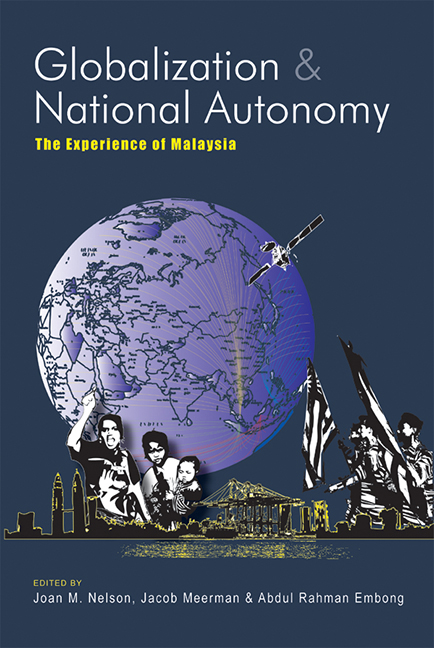Book contents
- Frontmatter
- Contents
- List of Abbreviations
- List of Tables and Figures
- Preface
- Contributors
- Chapter 1 Introduction
- Chapter 2 Developmentalist State in Malaysia: Its Origins, Nature, and Contemporary Transformation
- Chapter 3 The Look East Policy, the Asian Crisis, and State Autonomy
- Chapter 4 The Malaysian Success Story, the Public Sector, and Inter-ethnic Inequality
- Chapter 5 Poverty Eradication, Development, and Policy Space in Malaysia
- Chapter 6 Trade Liberalization and National Autonomy: Malaysia's Experience at the Multilateral and Bilateral Levels
- Chapter 7 Malaysia's Education Policies: Balancing Multiple Goals and Global Pressures
- Chapter 8 Malaysia's Healthcare Sector: Shifting Roles for Public and Private Provision
- Chapter 9 Globalization, Islamic Resurgence, and State Autonomy: The Response of the Malaysian State to ‘Islamic Globalization’
- Chapter 10 The National Culture Policy and Contestation over Malaysian Identity
- Chapter 11 Conclusions
- Index
Preface
Published online by Cambridge University Press: 21 October 2015
- Frontmatter
- Contents
- List of Abbreviations
- List of Tables and Figures
- Preface
- Contributors
- Chapter 1 Introduction
- Chapter 2 Developmentalist State in Malaysia: Its Origins, Nature, and Contemporary Transformation
- Chapter 3 The Look East Policy, the Asian Crisis, and State Autonomy
- Chapter 4 The Malaysian Success Story, the Public Sector, and Inter-ethnic Inequality
- Chapter 5 Poverty Eradication, Development, and Policy Space in Malaysia
- Chapter 6 Trade Liberalization and National Autonomy: Malaysia's Experience at the Multilateral and Bilateral Levels
- Chapter 7 Malaysia's Education Policies: Balancing Multiple Goals and Global Pressures
- Chapter 8 Malaysia's Healthcare Sector: Shifting Roles for Public and Private Provision
- Chapter 9 Globalization, Islamic Resurgence, and State Autonomy: The Response of the Malaysian State to ‘Islamic Globalization’
- Chapter 10 The National Culture Policy and Contestation over Malaysian Identity
- Chapter 11 Conclusions
- Index
Summary
The idea for this book was initially conceived by IKMAS not long after the successful convening of the Third International Globalization Studies Network (GSN) Conference held at Universiti Kebangsaan Malaysia in August 2006. IKMAS hosted this conference as a member of GSN, which is a worldwide consortium of centres of globalization studies. Fellows at IKMAS brainstormed the idea with a view to start a new research project to be conducted under the auspices of the incoming holder of the Pok Rafeah Distinguished Chair in International Studies, Professor Joan Nelson, from the American University, Washington, D.C. and the Woodrow Wilson International Center for Scholars of the Smithsonian Institute.
IKMAS’ first project on globalization had been conducted under the auspices of the first Pok Rafeah Chair, Professor J.H. Mittelman, who was at IKMAS in 1997 and 1999. That project resulted in an important publication by Routledge, London in 2001 under the title, Capturing Globalization, edited by J.H. Mittelman and Norani Othman. In that book, besides analysing a number of empirical cases, we explored the various theoretical perspectives on globalization and drew two important conclusions: first, developing countries like Malaysia need to adopt what is known as the ‘transformationalist approach’ in order to capture globalization, and second, we have to contribute to the debate on globalization to reflect the experiences of the South so that the globalization discourse can be made more global.
Thus, when Professor Nelson arrived at IKMAS in early October 2006 to occupy the Pok Rafeah Chair for a period of nine months, we soon held a series of brainstorming sessions with her. While taking note of IKMAS’ first collegial project on globalization, started almost ten years earlier, and agreeing that any new project must build on this achievement, we concluded that we had to move beyond the debate of the 1990s which tended to emphasize the retreat of the state, and incorporate insights from the literature that had emerged since we entered the twenty-first century. We took the position that the issue of globalization and national autonomy, particularly state autonomy, had to be re-visited, and that Malaysia presented an interesting and important case study for that purpose.
- Type
- Chapter
- Information
- Globalization and National AutonomyThe Experience of Malaysia, pp. xiii - xviPublisher: ISEAS–Yusof Ishak InstitutePrint publication year: 2008

